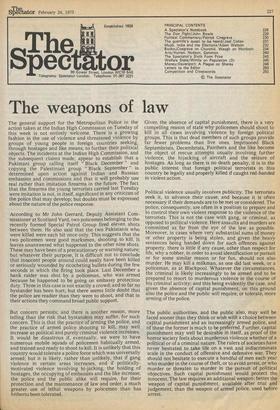The weapons of law
The general support for the Metropolitan Police in the action taken at the Indian High Commission on Tuesday of this week is not entirely welcome. There is a growing fashion in the use of violence and threatened violence by groups of young people in foreign countries seeking, through hostages and like means, to further their political objects. The incidents at the Indian High Commission, and the subsequent claims made, appear to establish that a Pakistani group calling itself " Black December" and copying the Palestinian group "Black September" is determined upon action against Indian and Russian embassies and commissions and that it will probably use real rather than imitation firearms in the future. The fact that the firearms the young terrorists carried last Tuesday were imitation is not, in itself, significant in any criticism of the police that may develop; but doubts must be expressed about the nature of the police response.
According to Mr John Gerrard, Deputy Assistant Commissioner at Scotland Yard, two policemen belonging to the recently formed Special Patrol Group fired eleven shots between them. He also said that the two Pakistanis who were killed were each hit once only. This suggests that the two policemen were good marksmen, shooting to kill. It leaves unanswered what happened to the other nine shots. These may have been of a precautionary or warning nature; but whatever their purpose, it is difficult not to conclude that innocent people around could easily have been killed or seriously wounded by ricocheting bullets during the few seconds in which the firing took place. Last December a bank raider was shot by a policeman, who was armed because he happened to be going on embassy protection duty. Three in this case is not exactly a crowd; and so far no bystander has been hurt; but there seems little doubt that the police are readier than they were to shoot, and that in their actions they command broad public support.
But concern persists; and there is another reason, more telling than the risk that bystanders may suffer, for such concern. This is that the practice of arming the police, and the practice of armed police shooting to kill, may well increase as political and purely criminal violence increases. It would be disastrous if, eventually, we were to have numerous mobile squads of policemen habitually armed, and trained and ready to shoot to kill. It is unlikely that this country would tolerate a police force which was universally armed; but it is likely, rather than unlikely, that if gang violence in certain areas increases, and if politically motivated violence involving hi-jacking, the holding of hostages, the occupying of embassies and the like increase, the police and the public alike will require, for their protection and the maintenance of law and order, a much greater use of lethal weapons by policemen than has hitherto been tolerated. Given the absence of capital punishment, there is a very compelling reason of state why policemen should shoot to kill in all cases involving violence by foreign political groups. This is that dead members of such groups provide far fewer problems than live ones. Imprisoned Black Septembrists, Decembrists, Panthers and the like become the object of rescue attempts usually involving further violence, the hijacking of aircraft and the seizure of hostages. As long as there is no death penalty, it is in the public interest that foreign political terrorists in this country be legally and properly killed if caught red-handed in violent action.
Political violence usually involves publicity. The terrorists seek it, to advance their cause, and because it is often necessary if their demands are to be met or considered. The police, consequently, are often in a position to prepare and to control their own violent response to the violence of the terrorists. This is not the case with gang, or criminal, as opposed to political violence. Here assaults and murders are committed as far from the eye of the law as possible. Moreover, in cases where very substantial sums of money or other property is being stolen, and given the heavy sentences being handed down for such offences against property, there is little if any cause, other than respect for life, why a robber, in order to avoid identification or pursuit or for some similar reason or for fun, should not also murder. He may kill a milkman, as one did last week, or a policeman, as at Blackpool. Whatever the circumstances, the criminal is likely increasingly to be armed and to be prepared to resort to murderous violence in the course of his criminal activity; and this being evidently the case, and given the absence of capital punishment, on this ground also the police and the public will require, or tolerate, more arming of the police.
The public authorities, and the public also, may well be faced sooner than they think or wish with a choice between capital punishment and an increasingly armed police, and of these the former is much to be preferred. Further, capital punishment may well be desirable in itself, as proof of the horror society feels about murderous violence whether of a political or of a criminal nature. The rulers of societies have never hesitated to take life on a vast and indiscriminate scale in the conduct of offensive and defensive war. They should not 'hesitate to execute a handful of men each year who murder in the course of theft, or to avoid arrest, or who murder or threaten to murder in the pursuit of political objectives. Such capital punishment would protect the innocent. The law requires an additional weapon: better the weapon of capital punishment, available after trial and judgement, than the weapon of armed police, used before arrest.


































 Previous page
Previous page